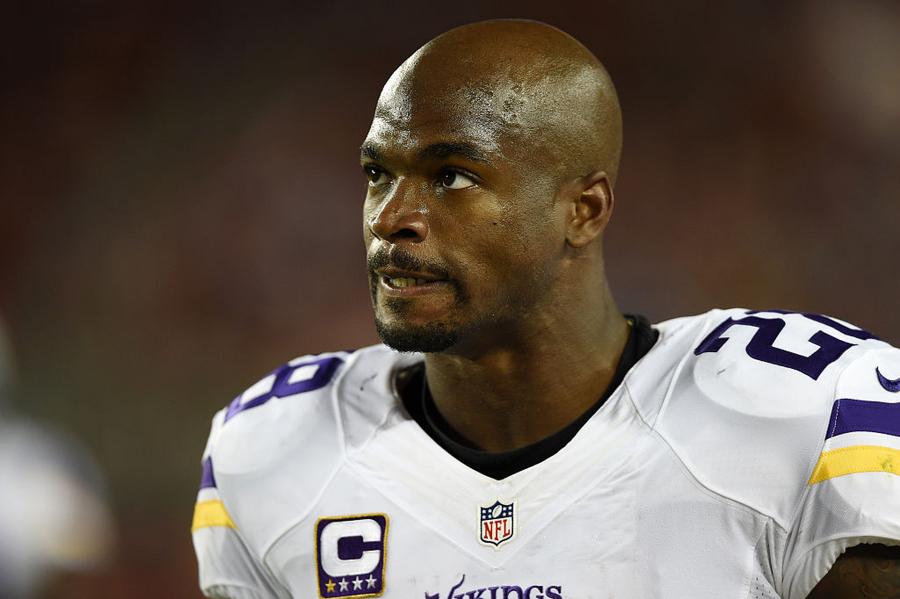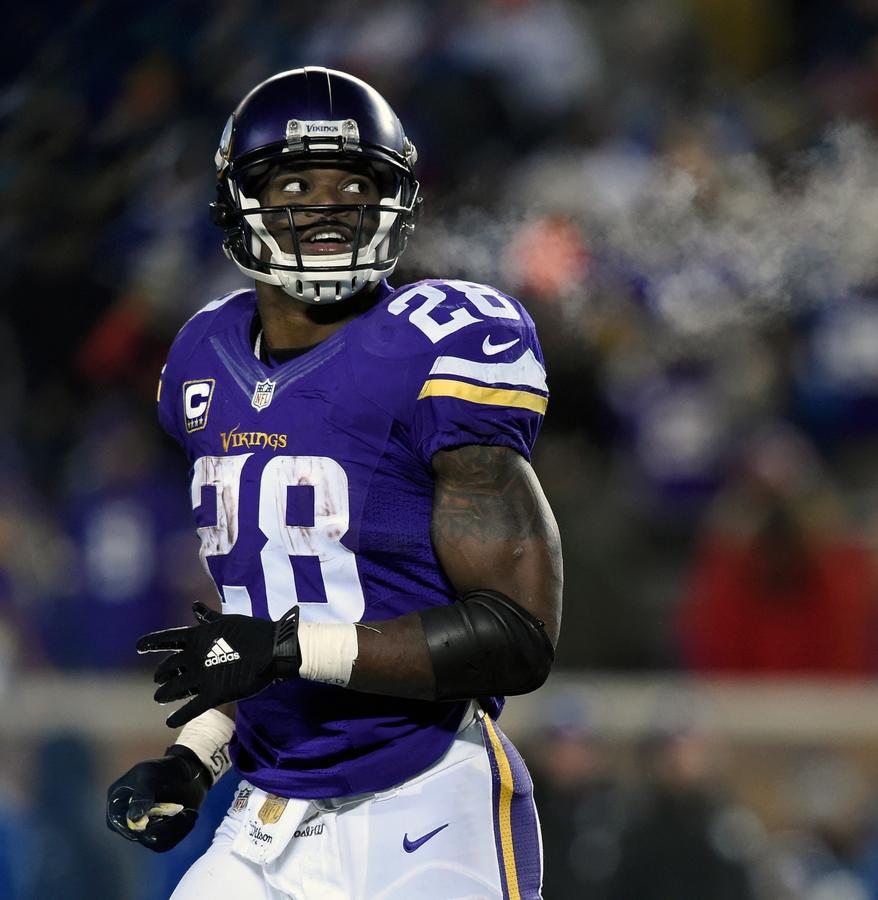What is Adrian Peterson's Net Worth and Salary?
Adrian Peterson is an American professional football running back who has a net worth of -$12 million. Unfortunately, after earning $103 million during his career, Adrian has experienced a number of legal and financial issues. More details on these issues later in this article, but the most important piece of information to understand his current negative net worth is that in 2016, Adrian took out a $5.2 million loan from a lender that specializes in short-term, high-interest financing for high-net-worth individuals. At the time he took out the loan, he was expecting to sign an $18 million extension with the Vikings. The Vikings did not offer an extension, and instead, Adrian signed a two-year, $7 million contract with the Saints and subsequently signed several smaller deals before his career ended in 2020. Meanwhile, he apparently did not pay down that loan, and by late 2024, with interest and fees, the amount had ballooned to $12.5 million. In September 2024, a judge in Houston ordered agents to accompany a debt collector to Adrian's home near Houston to collect any available assets to satisfy the $12.5 million judgment.
Adrian Peterson established himself as one of the NFL's most dominant running backs during his 15-season career (2007-2021). Drafted seventh overall by the Minnesota Vikings in 2007, Peterson made an immediate impact, rushing for 1,341 yards and 12 touchdowns as a rookie.
His 2012 season stands as his most remarkable achievement, when he rushed for 2,097 yards—just eight yards short of breaking Eric Dickerson's single-season record—while recovering from ACL surgery. This extraordinary performance earned him NFL MVP honors.
Throughout his career, Peterson amassed 14,918 rushing yards (fifth all-time), 120 rushing touchdowns, and seven Pro Bowl selections. He was named First-Team All-Pro four times and led the league in rushing three times.
After ten seasons with Minnesota, Peterson played for several teams, including the Saints, Cardinals, Washington, Lions, Titans, and Seahawks. Though his production declined in later years, his powerful running style, characterized by exceptional speed, vision, and strength, left an indelible mark on the sport.
Peterson's legacy includes being selected to the NFL's 2010s All-Decade Team and earning the nickname "All Day" for his relentless playing style and remarkable durability.

(Thearon W. Henderson/Getty Images)
Early Life
Adrian Lewis Peterson was born on March 21st, 1985, in Palestine, Texas. Raised by two former college athletes, Adrian formed a close relationship with his older brother Brian at an early age. Unfortunately, Adrian witnessed Brian's death at the age of 7 when he was killed by a drunk driver. Channeling his grief into athletics, Adrian saw football as a means of escape. At the age of 13, his father was arrested for money laundering and involvement with a crack cocaine business. After graduating from high school, Peterson attended the University of Oklahoma and finished as runner-up for the Heisman Trophy.
Career
Forgoing his final year of college, Peterson entered the 2007 NFL draft and was selected by the NFL Vikings. He quickly established himself as one of the brightest young stars of the league, winning the NFL Offensive Rookie of the Year award. His strong performances continued throughout the next few years, and in 2012, he won the NFL MVP award. In 2014, his career faltered amidst child abuse allegations, and Adrian was suspended for the remainder of the season.
When he returned, he struggled to regain his old form. After another slow season in 2017, the Vikings neglected to extend his contract, and he was signed by the New Orleans Saints. After a single season, he moved to the Arizona Cardinals, and he then spent another single season with the Washington Redskins in 2018. He stayed with the Redskins for two seasons before signing with the Detroit Lions in 2020.
Career Earnings
Over the course of his NFL career, Adrian Peterson earned over $103 million in salary alone, making him the highest-paid running back in league history by a wide margin. His earnings came from a combination of massive long-term deals with the Minnesota Vikings and shorter veteran contracts later in his career.
- 2007: Peterson entered the NFL as the 7th overall pick in the draft and signed a 5-year, $40.5 million rookie contract with the Minnesota Vikings. The deal included $17 million in guaranteed money and paid an average annual salary of around $8 million.
- 2011: After proving himself as one of the league's elite running backs, Peterson signed a record-breaking 6-year, $86.2 million extension with the Vikings. The deal made him the highest-paid running back in NFL history at the time, with an average salary of $14.4 million and over $36 million guaranteed.
- 2015: Peterson and the Vikings restructured his contract into a 3-year, $42 million deal, with $20 million guaranteed. This kept him among the highest-paid players at his position well into his 30s—an uncommon feat for NFL running backs.
- 2017–2019: After leaving the Vikings, Peterson signed a series of shorter, incentive-laden deals:
- In 2017, he signed a 2-year, $7 million contract with the New Orleans Saints but was traded mid-season to the Arizona Cardinals.
- In 2018, he joined the Washington Redskins on a veteran minimum contract, earning a base salary of just over $1 million.
- In 2019, Washington rewarded him with a 2-year, $8 million extension, which included a $1.5 million signing bonus.
- 2020: Peterson finished his career with the Detroit Lions, signing a 1-year deal worth $1.05 million.
Despite earning more than $100 million on the field, Peterson faced financial troubles later in life due to reported poor investments and legal disputes.
Financial Issues
Financial Issues
By 2019, Adrian Peterson's financial troubles had become public — a shocking turn for a player who had earned more than $100 million in salary during his NFL career. That year, Peterson's attorney issued a statement confirming that the former MVP was effectively broke, blaming the situation on his client having "trusted the wrong people" with his finances. The comment came in the wake of multiple lawsuits and judgments tied to unpaid debts and high-risk loans.
One of the most significant cases involved a $5.2 million loan Peterson took out in 2016 from DeAngelo Vehicle Sales LLC, a Pennsylvania-based lender that specializes in short-term, high-interest financing for high-net-worth individuals. According to court filings, Peterson used a portion of the funds to repay a payday loan company — an indicator of the financial strain he was already facing at the time. The original terms of the loan called for repayment within just four months at a 12% interest rate. Peterson failed to repay the principal on time, and with fees, penalties, and accumulating interest, the balance ballooned to $6.6 million. By 2021, a judge issued an $8.3 million judgment against him. By 2024, that figure had swelled to approximately $12.5 million.
In a separate but concurrent financial battle, Peterson was also ordered to repay $2.4 million on another loan from a Maryland lender. He defaulted on that loan as well, resulting in additional court proceedings and financial penalties.
These debts triggered aggressive collection efforts. In 2024, a Houston judge granted a request from court-appointed debt receiver Robert Berleth to enter Peterson's Missouri City, Texas, home — a suburb of Houston — to seize assets. According to court documents, Peterson was known to have "numerous assets" stored at the property. The judge ordered constables to accompany Berleth to ensure there would be no interference during the asset seizure.
The picture that emerged was one of a once-wealthy athlete caught in a cycle of loans used to plug previous financial gaps, compounding interest, and mounting legal trouble. Peterson's legal and financial woes illustrate the broader issue that even elite athletes with nine-figure earnings can be left financially devastated by poor advice, high-risk borrowing, and unchecked spending.
Legal Issues
In 2014, Peterson was indicted on charges of reckless or negligent injury to a child. He had used a wooden implement to discipline his four-year-old son. According to the prosecution, Adrian had used a tree branch to beat his son across his entire body, including his buttocks and genitals. In his defense, Peterson stated that he had been punished in a similar way during his own childhood.
Adrian eventually pleaded no contest, avoiding a jail sentence after reaching a plea agreement. He was put on probation, ordered to complete 80 hours of community service, and fined $4,000. Perhaps the most significant penalty was not imposed by a judge but rather the NFL. The league suspended Peterson, and it impacted his career significantly. In 2018, Adrian publicly admitted that he was still disciplining his son with a belt.

(Photo by Hannah Foslien/Getty Images)
Real Estate
After trying to offload his home in Texas for four years, Peterson finally succeeded in selling the mansion in 2020. It was originally listed for $8.5 million in 2016, but eventually it sold for about $4.5 million. This was about $500,000 less than what he originally paid for it back in 2013. Spanning 10,582 square feet, the mansion boasts six bedrooms, a library, a wine cellar, a theater, and a motor court. Additional highlights include a game room, bar, and swimming pool.
In 2021, it was reported that he had listed a second property in Texas for $5.3 million. This home is in Houston, and Peterson originally purchased it for $3.4375 million back in 2016. Located in the neighborhood of Rivercrest Estates, the home features traditional architecture and sits on 3.5 acres of land. It also boasts 11 bedrooms and 11,384 square feet of living space. Additional features include a wine bar, an aquarium, an elevator, a private theatre, an indoor basketball court, a gym, hydrotherapy immersion tanks, a freshwater pool, a golf putting green, and a four-bedroom guesthouse. He finally accepted $3.5 – $4 million in June 2021 (the exact sale price was not disclosed).
/2010/12/Adrian-Peterson-1.jpg)
/2021/02/barry-sanders.jpg)
/2010/05/Daunte-Culpepper.jpg)
/2009/12/vick-thumb.jpg)
/2010/04/Emmitt-Smith-1.jpg)
/2010/04/LaDainian-Tomlinson.jpg)
/2021/11/rich-vos.jpg)
/2015/01/GettyImages-512607330.jpg)
/2010/01/GettyImages-149907344.jpg)
/2010/02/Ron-Jeremy.jpg)
/2020/01/Tammy-Faye-Messner.jpg)
/2019/09/Taylor-Fritz.jpg)
/2012/04/Pat-Robertson-1.jpg)
/2019/09/af.jpg)
/2014/04/GettyImages-909023006.jpg)
/2021/09/Jessica-Hahn.jpg)
/2011/07/creflo-dollar.jpg)
/2010/12/Adrian-Peterson-1.jpg)
/2010/04/LaDainian-Tomlinson.jpg)
/2019/07/GettyImages-1052132242.jpg)
/2025/06/adrian-peterson.jpg)
/2014/09/GettyImages-488257992.jpg)
/2021/01/GettyImages-1277403966.jpg)
/2015/07/GettyImages-452776799.jpg)
/2015/05/pete.jpg)